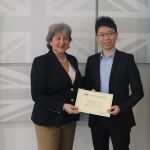(Part Two) Medicine and law have always held his interest and combining these two interests into a career would be the best choice. This is exactly what Dr Chan Chee Ching, a holder of double master’s degrees, did. He is currently pursuing his third master’s degree – Master of Laws at City, University of London.
He started his medical studies at IMU and transferred to University of Edinburgh for completion of his degree – a MBChB from the University of Edinburgh in 2006. He was an Ear, Nose and Throat Academic Clinical Fellow under the Yorkshire and Humber Deanery, England from 2010 to 2012.
 He subsequently went to Cardiff University, Wales to pursue a 3-year law degree as he has strong interest in medical law. Upon successfully completing his LLB, he undertook the Barrister Professional Training Course in 2015 to become a Barrister-at-law. He was called to the Bar and was admitted into The Honourable Society of Lincoln’s Inn in 2016. Currently, he is back in Malaysia and undergoing his pupillage with Raja, Darryl and Loh Advocates and Solicitors. Dr Chan Chee Ching recalls his time studying at IMU and felt fortunate that “IMU has opened the door for me to study abroad at the reputable medical school of University of Edinburgh.” He believes that in the current era, “Doctors need to think laterally and not be restricted to the fact that we are doctors. We can do more in other aspects to help patients such as involving in education, research and administration of healthcare services.” Why ENT? I have always preferred specialties that involve manual dexterity. Therefore, I am keen to specialise in surgery. I chose ENT surgery because this specialty covers 3 distinct areas of anatomy, i.e. the ear, the nose and throat. Furthermore, ENT patients come from all walks of life, from paediatric patients presenting with acute otitis media to geriatric patients presenting with laryngeal carcinoma. Last but not least, from a surgical point of view, ENT surgery allows me the opportunity to perform both macrosurgery like laryngectomy and microsurgery like myringotomy. Does your medical knowledge help in any way in your current profession?
He subsequently went to Cardiff University, Wales to pursue a 3-year law degree as he has strong interest in medical law. Upon successfully completing his LLB, he undertook the Barrister Professional Training Course in 2015 to become a Barrister-at-law. He was called to the Bar and was admitted into The Honourable Society of Lincoln’s Inn in 2016. Currently, he is back in Malaysia and undergoing his pupillage with Raja, Darryl and Loh Advocates and Solicitors. Dr Chan Chee Ching recalls his time studying at IMU and felt fortunate that “IMU has opened the door for me to study abroad at the reputable medical school of University of Edinburgh.” He believes that in the current era, “Doctors need to think laterally and not be restricted to the fact that we are doctors. We can do more in other aspects to help patients such as involving in education, research and administration of healthcare services.” Why ENT? I have always preferred specialties that involve manual dexterity. Therefore, I am keen to specialise in surgery. I chose ENT surgery because this specialty covers 3 distinct areas of anatomy, i.e. the ear, the nose and throat. Furthermore, ENT patients come from all walks of life, from paediatric patients presenting with acute otitis media to geriatric patients presenting with laryngeal carcinoma. Last but not least, from a surgical point of view, ENT surgery allows me the opportunity to perform both macrosurgery like laryngectomy and microsurgery like myringotomy. Does your medical knowledge help in any way in your current profession?
| The answer is definitely positive. |
| Firstly, I am more familiar with the medical jargons and abbreviations compared to a “normal” lawyer. I can understand the material facts of the case faster. |
| Secondly, I am more familiar with medical documentations, so generally I can locate relevant information faster. For example, I know where the nursing notes are, where the drugs charts are or where the investigation results are. |
| Thirdly, medical literatures are frequently used as evidence in court. It is easier for me to find relevant published literature and understand their significance or importance because of my medical background. |
| Lastly, and probably the most important advantage is that because I am a doctor, there are less gaps in communicating with doctors because I can understand their language better from a medical point of view. In addition, doctors generally don’t like to meet with lawyers because lawyers mean “problems/negligence” to them. My backgound as a doctor eliminates that barrier to a certain degree. |

 How does it feel to combine two areas of work that you are passionate about? Perhaps it is uncommon to see someone with double degree in medicine and law in Malaysia, a lot of people asked me about my experience. For the past 4 years, since I started studying law degree at Cardiff University, I was probably asked more than 1,000 times on some similar, common questions.
How does it feel to combine two areas of work that you are passionate about? Perhaps it is uncommon to see someone with double degree in medicine and law in Malaysia, a lot of people asked me about my experience. For the past 4 years, since I started studying law degree at Cardiff University, I was probably asked more than 1,000 times on some similar, common questions.
| Firstly I was asked most frequently, ‘why did I quit medicine to do law?’ They thought there must be something happened that made me changed my mind. Five years of studying medicine was a long time and it was expensive, with the earning power that I already had why I should quit my job. I have planned this. I would not say I quit medicine. For me it is a continuation. It is my aim to do medicolegal work in the future. Hence the reason I study law after medicine. |
| The second most frequent question I was asked is, ‘which is harder? Medicine or law? I must say they are equally hard but in different way. For example, medicine is hard in the sense that I was required to memorise a list of things. There may be ten causes for headaches or abdominal pain. Moreover, medicine requires a certain degree of practical skills like using the stethoscope or the scalpel. On the other hand, law requires me to memorise legal principles and authorities. It also asks me to think critically and evaluate the law. This is not required as much in medicine. |
Most people are impressed when I tell them about my double degree of medicine and law. Some people told me that I have made great achievements by passing the two hardest subjects. Some people told me that I am the role model that every Asian parents wish their children to become. Others told me that I must love studying a lot.
I feel that my achievement are not extraordinary or outstanding but it does require a longer time and persistence. I am really glad that my parents are very supportive on my decisions and actions. It is not easy convince one’s parents that he is not going to become a doctor bearing in mind that the parents have already spent half a million on the medical degree. However, my parents did not even query a single question on me.
What are your future plans? If there are opportunities, I would like to involve in improving the Malaysian health policies. Hopefully my background as a doctor and lawyer will provide me with better understanding and sounder analyses in determining the appropriate health policies. Part One of Dr Chan’s journey.









